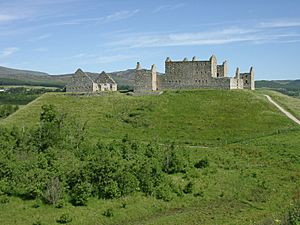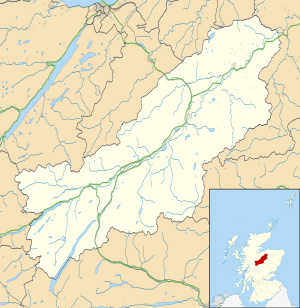Ruthven Barracks facts for kids
Quick facts for kids Ruthven Barracks |
|
|---|---|
| Ruthven | |

Ruthven Barracks
|
|
|
Location within Badenoch and Strathspey
|
|
| Coordinates | 57°04′20″N 04°2′22″W / 57.07222°N 4.03944°W |
| Type | Barracks |
| Site information | |
| Operator | |
| Site history | |
| Built | 1229 |
| In use | 1229-1746 |
The Ruthven Barracks are old army buildings located near Ruthven in Badenoch, Scotland. They are the best-kept of four barracks built in 1719. These were constructed after a rebellion known as the Jacobite rising of 1715.
The barracks stand on the site of an even older castle. The complex has two large, three-story buildings. These buildings form two sides of a walled area. Each floor in these blocks has two rooms. The walls and buildings have small openings called loopholes. These were for soldiers to fire their muskets through. There are also strong towers at opposite corners.
Jacobite rebels destroyed the barracks in 1746. This happened after they retreated from the Battle of Culloden. Today, the ruins are looked after by Historic Environment Scotland. They are a protected historical site. You can visit them anytime for free.
History of Ruthven Barracks
Early Castles on the Hill
A very first castle was built on this hilltop in 1229. It might have been built by a powerful family called the Comyns. During the 1200s, the castle belonged to the Lords of Badenoch. These were the leaders of Clan Comyn.
A famous person named Alexander Stewart, Earl of Buchan used this castle. He was known as the "Wolf of Badenoch." He was a younger son of King Robert II of Scotland. This first castle was torn down in 1451. A new, second castle was finished in 1459.
From the 1400s to the 1500s, the castle was owned by the Earls of Huntly. They were the leaders of Clan Gordon. They were also the main lords of Badenoch at that time. The castle was fought over during the Wars of the Three Kingdoms. Later, John Graham, 1st Viscount Dundee, attacked the castle. He badly damaged it during the Jacobite rising of 1689.
Battles and Rebellions
Because there was still a lot of unrest, the British government decided to build strong barracks. They chose important locations for these buildings. The new barracks at Ruthven were finished in 1721. They were built on the same castle hilltop.
The barracks could hold 120 soldiers and 28 horses for dragoons. Dragoons were soldiers who rode horses but fought on foot. In August 1745, a small group of 12 soldiers defended the barracks. They were led by Sergeant Terrence Molloy. They fought against 200 Jacobite rebels. The soldiers lost only one man. They killed at least two Jacobites and wounded many more.
The next year, Lieutenant Terrence Molloy had to surrender. A much larger Jacobite force attacked with two cannons. They were led by John Gordon of Glenbucket. The government troops fought back at first. They killed many Jacobites. But after a short siege, they had to give up.
On the day after the Battle of Culloden in 1746, about 3,000 Jacobites went to Ruthven Barracks. They were waiting for Prince Charles Edward Stuart to tell them what to do. But the Prince sent them a message on April 20th. He told them to "let every man seek his own safety in the best way he can." This meant the situation was hopeless. The Jacobite army left and destroyed the barracks on April 17, 1746. The ruins you see today are what is left.
 | Percy Lavon Julian |
 | Katherine Johnson |
 | George Washington Carver |
 | Annie Easley |


